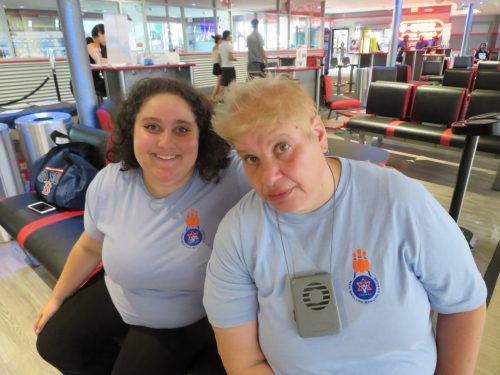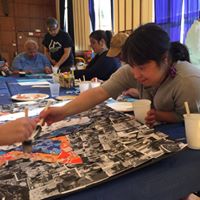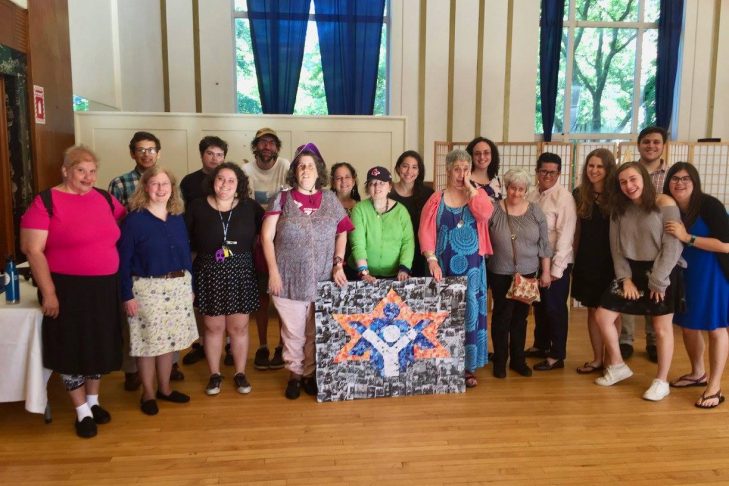Before I encountered New England Yachad, I had had very few interactions with people with disabilities. When I was invited to intern at Yachad this summer, I was both overjoyed and concerned: I had never taught those with disabilities, but as a rising junior majoring in art education at UMass Dartmouth, I was determined to provide a positive artistic learning experience.
I have always loved the idea of teaching, and over the last few years I have been fortunate enough to be an assistant teacher as both a Hebrew school madrichah and through the America Reads program at my university. In the classroom, I love facilitating discussion, watching as students learn, grow and create. As an artist, I am always eager to pass along my knowledge, skills and passion for the visual arts.
On my first day with Yachad, I met Jonathan, a kind and hardworking individual who helps out in the office as a volunteer staff person for two hours a week. As soon as we were introduced, Jonathan showed me an immediate kindness and genuine interest. I was assigned to work one-on-one with him, to do some tasks around the office and, more important, help him with his tzedakah box collections. As I let him guide me through his tzedakah retrieval routine, I could see how proud he was of his work and how much he loved Yachad.
Later that day, I met a dozen or so other Yachad members of varying abilities, each with such unique personalities. These members of Yachad in the art appreciation program were so eager to invite me into their space and show me their artwork. I knew then that I did not need to worry about making a connection with the members because they showed just as strong a desire to connect with me!

In the single hour I painted alongside two members, Linda and Becky, I learned a great deal. When Linda needed help selecting colors for her painting, she welcomed my help arranging her palette and began to work diligently to fill her canvas with color. When Becky seemed sad and apprehensive about painting, Linda joined me in encouraging Becky, suggesting how she could continue building her image on the canvas. Becky eventually started painting, and I noticed how beautiful and colorful her painting became. As I walked around the room, I saw each member making exceptional, original works.
Since that first day I have enjoyed participating in such events as bowling, art appreciation, adaptive rowing, Yom Sport and more with adults with disabilities. I’ve met so many wonderful people at all these events and I’ve seen each member experience joy, growth and achievement. That’s why I’ve decided to further empower these amazing individuals through the thing that empowers me: creativity through art. I am developing my own art class, called the Earth-Friendly Art Workshop, in which we will use repurposed, recycled and organic materials to make unique types of artwork over a seven-week period.
As an honors art education major, I am expected to design, perform and present a thesis project on a subject in my field that interests me. My wonderful experience with Yachad has helped me choose my topic: through lessons in overcoming functional fixedness in art making, I hope to help the Yachad participants in my Earth-Friendly Art Workshop series become more creative and empowered. The documentation, assessment and hands-on experience of this class will become the basis of my thesis.
Functional fixedness is a cognitive bias that limits creative thinking: a person who experiences functional fixedness sees objects as only able to perform the task they were designed to carry out—seeing a pencil as just a writing tool or a bottle cap as only belonging on top of a bottle, for example. A person who is aware of and subsequently overcomes this bias opens their mind to other creative possibilities, such as seeing a pencil as a tool to work with clay, or a bottle cap as a mosaic tile. This ability to see beyond the functionally fixed can enhance participants’ creativity and problem-solving, as well as boosting confidence, purpose and self-esteem.
Furthermore, my class also educates our participants on environmental issues and sustainability. One goal of the program is to teach participants to be aware of the importance of our environment and be well equipped to create beautiful and expressive repurposed or recycled artworks. An overarching theme of the series is tikkun olam, or repairing the world, and I believe that by engaging with art, environmentalism and their own cognitive flexibility, Yachad members will learn how they can positively impact their world through their creative contributions.

This post has been contributed by a third party. The opinions, facts and any media content are presented solely by the author, and JewishBoston assumes no responsibility for them. Want to add your voice to the conversation? Publish your own post here. MORE


